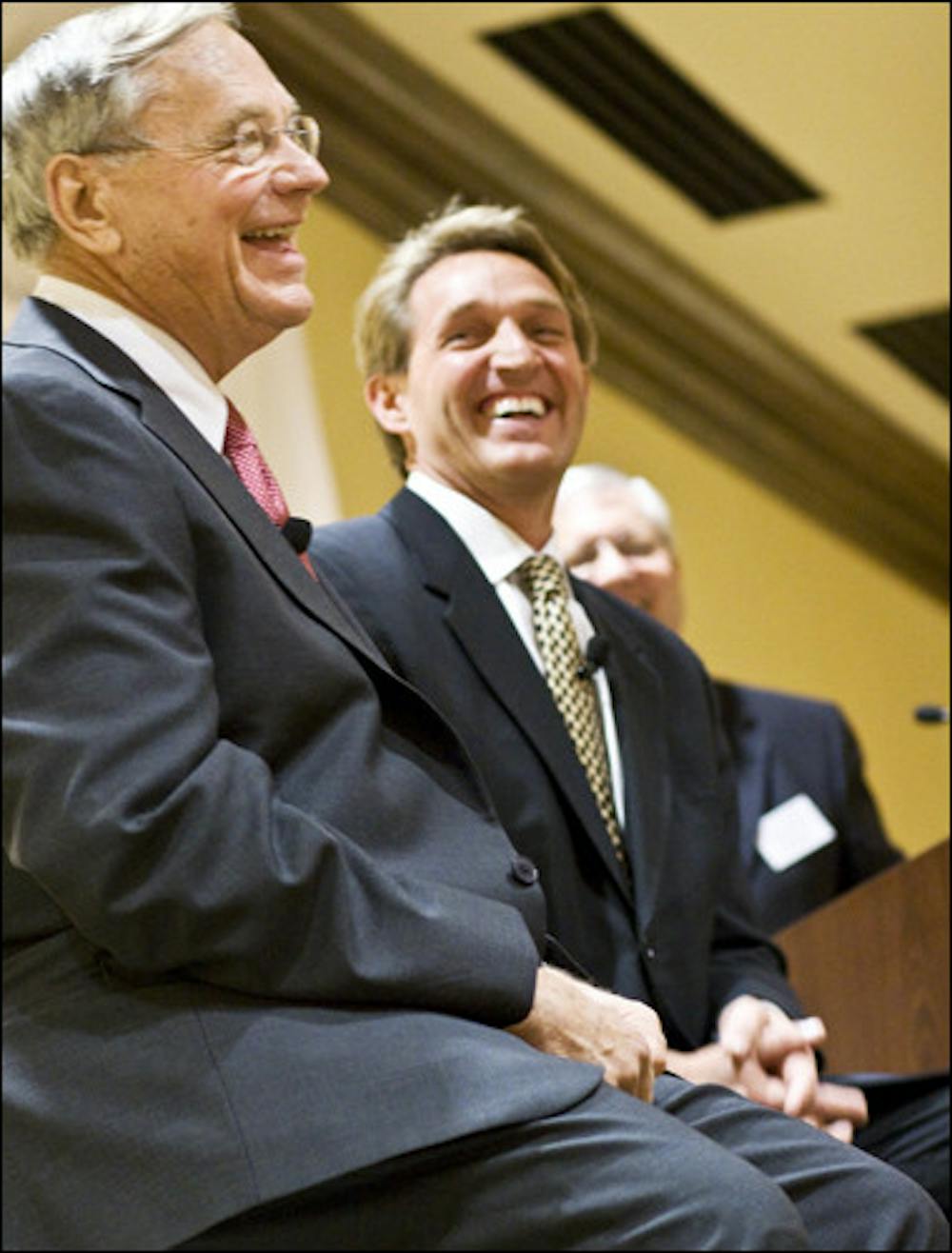U.S. Congressmen Harry Mitchell, D-District 5, and Jeff Flake, R-District 6, said bipartisan cooperation is the key to getting the country out of the economic crisis it is currently in.
Though Flake and Mitchell occupy opposite ends of the political spectrum, the two took time out of their two-week legislative district work period to speak together on Thursday morning at the Chandler Hilton.
The representatives spoke to a group of about 100 local politicians and prominent business owners about the work they have done so far this congressional session. The topic that dominated their speeches, as expected, was the economy, although they touched on issues ranging from the environment to health care.
Mitchell and Flake spoke first about the $165 million bonuses awarded to executives at AIG, which was given $170 million in bailout money by the government under the Troubled Asset Relief Program, or TARP.
Mitchell was one of only six Democrats in the House of Representatives who opposed a recent bill to tax 90 percent of bonuses given by firms receiving government assistance.
Mitchell said the bill was nothing more than a response to populist anger — what is really needed, he said, is a system that holds businesses truly accountable for the way firms use TARP money.
“The bill did not really address the issue,” Mitchell said. “More taxpayer money shouldn’t be committed to TARP until there is adequate oversight and voter accountability.”
Flake praised Mitchell for taking an unpopular, nonpartisan stance on the issue.
“I think all of us were outraged when we found out about those bonuses, but that [bill] was not the right way to respond to it,” Flake said.
The congressmen said they were working together on a number of bills, including one that would allow flights from Reagan National Airport in Washington, D.C., to Western cities, a change they said would allow companies based in those cities to be more competitive. They also said they were working to lift the travel ban on Americans to Cuba, allowing family members to exchange goods and visit one another.
After their prepared speeches, Flake and Mitchell took questions from the audience.
Brian Campbell, who sits on the director’s board of the Greater Phoenix Economic Council, asked them how to replace the jobs and resources that could be lost when research labs at Williams Air Force Base in Chandler are moved to Ohio.
Flake suggested selling the property and remaining equipment to ASU so it could be converted into a research facility.
“[Mitchell and I] will work together to make sure that ASU can use the facility for the long term,” Flake said.
Flake and Mitchell showed differences when moderator Marty Schultz asked them to comment about proposals to produce alternative forms of energy, especially solar energy, in Arizona.
Flake said he was skeptical of proposals for government investment into energy companies, saying similar investments in ethanol had been “a bust.”
“I would rather see the free market make those investments, rather than government,” Flake said.
Mitchell said a combination of investment and tax incentives could, in the short-term, create jobs and stimulate the economy. In the long-run, he said, it could reduce reliance on foreign oil and help improve the environment.
“Ultimately, for our environment and national security, we’ve got to find a way to get off fossil fuels,” Mitchell said.
Although the two congressmen disagreed on key economic issues, such as the necessity of the stimulus package, they agreed that party leadership would need to be more willing to compromise than it has been recently, in order to help guide the country out of the recession.
“It’s in everyone’s interest to be more open,” Flake said. “We’ll get through this rough patch. [And] if we swing too far to one side or another [politically], the voters will bring us back.”
Reach the reporter at derek.quizon@asu.edu.




